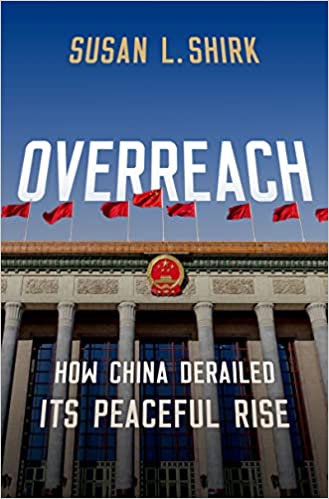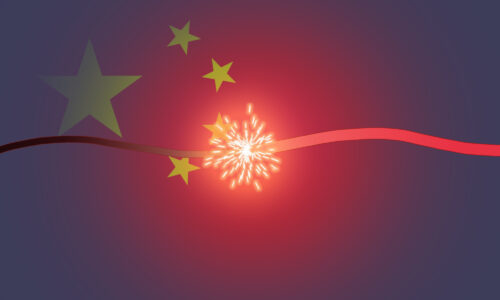‘Overreach’: What happened to the U.S.-China relationship?
“[China] brought the backlash on themselves,” Susan Shirk writes in her new book, “and they have done it by overreaching.”

Susan Shirk was witness to the first flourishing of modern China’s opening. She traveled to the People’s Republic from Hong Kong in 1971, the year before U.S. President Richard Nixon’s famed visit to Beijing. During her stay, Shirk met Chinese Premier Zhōu Ēnlái 周恩来, and asked him what had prompted the softening of attitudes toward establishing diplomatic links with the U.S. “Well, the Chinese people and the American people want to be friends,” he told her. “So, if the people want to be friends, the governments have to talk to each other. And if the governments are going to talk to each other, we have to invite the president.”
In her new book, Overreach: How China Derailed Its Peaceful Rise, Shirk — now director of the 21st Century China Center at the University of California, San Diego, and self-described “old China hand” — writes about what seems the conclusion of the narrative arc begun in the early 1970s. Over the last 40 years, Shirk writes, China and the U.S. wove “a dense fabric of trade, investment, technology, education, and personal ties that benefited people in both countries.” Today, however, the two countries have become so fearful of each other that “they are weaponizing their interdependence.” Shirk’s book is an attempt to explain how things got so bad, and — in a final section reflecting on her previous role as an advisor in the U.S. government — offer some suggestions to both sides as to how they might be made better.
Shirk’s answer to the question of “what happened” is found in the book’s title. Rather than being an inevitable clash resulting from China’s rise to challenge U.S. hegemony, Shirk argues that the hardening of American attitudes to China — one of the few policy positions which unites Republicans and Democrats — and the new Cold War that has ensued is the consequence of China’s decision-making over the last 16 years or so. “They brought the backlash on themselves,” she writes, “and they have done it by overreaching.”
What does it mean for a country to overreach? “Most definitions say that it’s to act in an exaggerated way or to take things to an extreme — and here’s the critical part — in a manner that snaps back to harm yourself,” Shirk told The China Project via video call from her home in California. “So, it’s self-defeating, counterproductive, extreme actions, and the main argument of the book is that overreach is not just a danger, a threat to peace for the United States or the West, but it really is damaging China itself.”
Aggressive policy shifts have come to define Xí Jìnpíng’s 习近平 tenure as China’s leader, but Shirk sees the country’s overreach as preceding the rule of Xi, tracing its roots to the era of Hú Jǐntāo 胡锦涛, who was in power from 2002 to 2012. Hu is often seen as a somewhat bland, technocratic leader whose rule was characterized by a collective approach to leadership. It seems puzzling, Shirk observes, that China’s overreach began under Hu. “What’s tragic, I think, is that during his first term, Hu Jintao never mobilized a coalition to support the continued reforms [of the ’80s and ’90s] and instead allowed the ‘control coalition’ to take over,” Shirk says.
This control coalition was a loose affiliation of public security and propaganda organs, as well as the military and paramilitary forces, led by “oligarchs in the Politburo and its Standing Committee [who] sought bigger budgets and influence for the interest groups they represent,” according to Shirk. A key inflection point in Hu’s reign came in 2008, the year of both the Beijing Olympics and the global financial crisis. There was, Shirk observes, “a tightening up before the Olympics — as we often see in China before some major event to prevent nasty surprises, collective action or protests — but it didn’t ever go back.” Nationalism became weaponized as China struggled to deal with protests in Tibet and unrest in Xinjiang. In the South China Sea, Beijing began to test the willingness of other countries to dispute their fantastical new delineations by sending enforcement ships into disputed waters, an approach which seemed to reflect a new, more provocative approach to foreign policy.
While the roots of today’s domestic and foreign overreach can be traced to the Hu era, Xi Jinping’s restoration of a Mao-style personalistic leadership approach came as a substantial and surprising shift. During Dèng Xiǎopíng’s 邓小平 years as paramount leader, which spanned the 1980s, concerted efforts had been made to move China away from such a mode of leadership; the memory of the brutal decade of the Cultural Revolution meant that the Chinese people and its leaders had come to vividly understand the perils of the cult of personality. Though this shift was consensual, it was never formalized. “I think it was relatively easy for Xi Jinping to restore personalistic leadership in China and centralized power after these decades of reforms,” Shirk says, “because Deng Xiaoping never went far enough in moving beyond reform inside the party to have a legislature and a legal system that could really check political rulers. So the political rulers have never been constrained or controlled by political institutions outside the party.”
Shirk’s analysis frames Xi’s aggressive policy moves not as part of any grand strategy, but as a series of significant mistakes, against a backdrop of predictable challenges which result from China’s demography — in particular its aging population. “What’s shocking is how self-inflicted the harm to China’s economic development is,” she says, referencing sudden shifts such as recent attacks on private business. “Development is no longer number one, and foreign investors, as well as many people inside China, are seeing that clearly for the first time.”
Xi has been ruthless in constructing a system in which those inside China who might broadly concur with Shirk’s analysis of Xi’s policy mistakes are powerless in the face of his ruthless quelling of dissent, within and without the party. “Nobody believes that there’s any chance of the Central Committee standing up to his nominations for the Politburo or his third term,” she says. “As we come up to the Party Congress, we see just how little they can do.”
“And that’s kind of amazing, isn’t it?” she adds with a shake of her head. “That it was so easy.”
Also see: Shirk’s previous appearances on the Sinica Podcast:
- The fragile superpower and trepidation over Trump
- U.S.-China relations after six months of Trump
- China policy and the American presidency
- U.S.-China relations in 2020
For more book reviews, see our Reading China archive.







